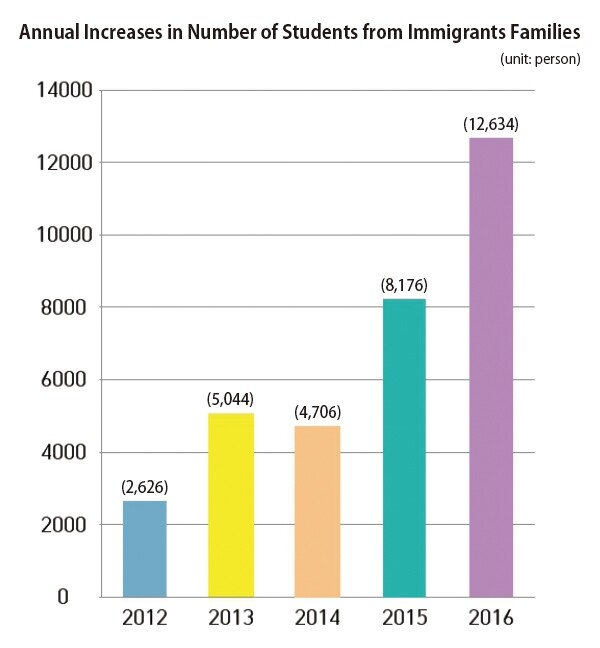hankyoreh
Links to other country sites 다른 나라 사이트 링크
Childcare centers habitually reject children of immigrant mothers

“I went to a lot of different places, but none of them would take [my child].”
An international resident of South Korea in [her] thirties was rejected by several different day care centers and kindergartens where she attempted to send her child. “We’re worried [the child] won’t be able to fit in with a different skin color,” one child care institution told her. “The child care costs will probably be too high,” another said. “We don’t have any African children here,” said a third. The resident finally managed to place her child at a center 40 minutes from their home, at a cost of 460,000 won (US$430) per month.
“It’s tough. It’s expensive, and [for my child] is so far away,” she lamented.
South Korea’s day care centers and kindergartens are off limits to may foreign children due to local parents’ prejudices about skin color and international residents’ social status. The Gyeonggi Institute of Research and Policy Development for Migrants’ Human Rights (director Oh Gyeong-seok) recently released findings from a study of 2017 basic rights conditions for foreign children in Gyeonggi Province, for which 145 foreign parents of foreign children were surveyed.
Of the 145 total foreign children, forty-seven were enrolled in elementary school. Among the 98 children aged five and under attending child care institutions, 21.7% were placed in a center that accepted foreign children after failing to win placement at another domestic child care center, the results showed.
Around three out of ten respondents said they had experienced being rejected by a domestic institution, with 13% reporting that they had placed their child with their current center because of the presence of other foreign children or children from their home country. Another 22.4% of foreign children below school age did not attend a domestic child care center at all – over ten times the 1.7% rate of child care center nonattendance for South Korean children.
Once they are finally placed at a center, the biggest struggle for foreign children is communication (36.7%), followed by making friends (16.7%), discrimination (13.3%), and bullying (10%), the results showed.
My child was “physically abused”
“My child was physically abused by a teacher at the day care center, yet we didn’t get any apology or compensation,” said the foreign parent of a four-year-old child. “The center’s director said to me, ‘We’re not going to accept any more people from [name of home country].”
Another foreign parent who participated in the monitoring study told investigators, “They said black children could not go there. It was actually really fortunate – they refused right up front. Imagine how tough it would have been if my child had attended there.”
While they are categorized as “foreign,” most of the children are effectively Koreans, having been born and grown up in South Korea. Of the 175 children in the study, just 36.6% had been born overseas; the number of foreign children born in South Korea was nearly twice as high at 63.4%.
The parents of foreign children also face discriminatory treatment in terms of costs. Average monthly child care fees for foreign children totaled 277,045 won (US$258.32), or more than double the 122,100 won (US$113.85) average for young South Korean children. South Korean parents receiving free child care through the Nuri Curriculum only need to pay additional costs – benefits that foreign parents do not receive.
“Foreign children face a twofold problem: the economic burden of child care costs, and discrimination against foreigners,” said Lee Kyung-sook, a team director with the Gyeonggi Institute.
“There need to be improvements so that children are guaranteed basic child care and education rights without discrimination,” Lee said.
By Hong Yong-duk, South Gyeonggi correspondent
Please direct comments or questions to [english@hani.co.kr]

Editorial・opinion
![[Column] Park Geun-hye déjà vu in Yoon Suk-yeol [Column] Park Geun-hye déjà vu in Yoon Suk-yeol](https://flexible.img.hani.co.kr/flexible/normal/500/300/imgdb/original/2024/0424/651713945113788.jpg) [Column] Park Geun-hye déjà vu in Yoon Suk-yeol
[Column] Park Geun-hye déjà vu in Yoon Suk-yeol![[Editorial] New weight of N. Korea’s nuclear threats makes dialogue all the more urgent [Editorial] New weight of N. Korea’s nuclear threats makes dialogue all the more urgent](https://flexible.img.hani.co.kr/flexible/normal/500/300/imgdb/original/2024/0424/7317139454662664.jpg) [Editorial] New weight of N. Korea’s nuclear threats makes dialogue all the more urgent
[Editorial] New weight of N. Korea’s nuclear threats makes dialogue all the more urgent- [Guest essay] The real reason Korea’s new right wants to dub Rhee a founding father
- [Column] ‘Choson’: Is it time we start referring to N. Korea in its own terms?
- [Editorial] Japan’s rewriting of history with Korea has gone too far
- [Column] The president’s questionable capacity for dialogue
- [Column] Are chaebol firms just pizza pies for families to divvy up as they please?
- [Column] Has Korea, too, crossed the Rubicon on China?
- [Correspondent’s column] In Japan’s alliance with US, echoes of its past alliances with UK
- [Editorial] Does Yoon think the Korean public is wrong?
Most viewed articles
- 1‘We must say no’: Seoul defense chief on Korean, USFK involvement in hypothetical Taiwan crisis
- 2N. Korean delegation’s trip to Iran shows how Pyongyang is leveraging ties with Moscow
- 3‘Weddingflation’ breaks the bank for Korean couples-to-be
- 4[Reportage] On US campuses, student risk arrest as they call for divestment from Israel
- 5Amnesty notes ‘erosion’ of freedom of expression in Korea in annual human rights report
- 6[Column] Park Geun-hye déjà vu in Yoon Suk-yeol
- 7Korea sees more deaths than births for 52nd consecutive month in February
- 8[Editorial] New weight of N. Korea’s nuclear threats makes dialogue all the more urgent
- 9Will NewJeans end up collateral damage in internal feud at K-pop juggernaut Hybe?
- 10[Guest essay] The real reason Korea’s new right wants to dub Rhee a founding father